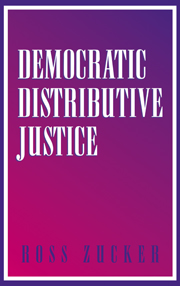Book contents
- Frontmatter
- Contents
- Acknowledgments
- 1 Democracy and Economic Justice
- Part I Unequal Property and Individualism in Liberal Theory
- 2 The Underlying Logic of Liberal Property Theory
- 3 Unequal Property and Its Premise in Locke's Theory
- 4 Unequal Property and Individualism, Kant to Rawls
- Part II Egalitarian Property and Justice as Dueness
- Part III Egalitarian Property and the Ethics of Economic Community
- Part IV Democracy and Economic Justice
- Conclusions
- References
- Index
3 - Unequal Property and Its Premise in Locke's Theory
Published online by Cambridge University Press: 02 December 2009
- Frontmatter
- Contents
- Acknowledgments
- 1 Democracy and Economic Justice
- Part I Unequal Property and Individualism in Liberal Theory
- 2 The Underlying Logic of Liberal Property Theory
- 3 Unequal Property and Its Premise in Locke's Theory
- 4 Unequal Property and Individualism, Kant to Rawls
- Part II Egalitarian Property and Justice as Dueness
- Part III Egalitarian Property and the Ethics of Economic Community
- Part IV Democracy and Economic Justice
- Conclusions
- References
- Index
Summary
John Locke made two major contributions to the theory of property: a justification for assigning the right of property to individuals rather than to collectivities and a justfication for a principle of unequal distribution of economic resources, goods, and money. The repudiation of Soviet communism in the late twentieth century has rendered Locke's first justification less controversial because it has led to more general agreement on assigning property to individuals rather than to states. But the reduction in the threat of Soviet communism may make his second justification more controversial, because market societies may become secure enough to contemplate the great disparities of income and wealth that prominently mark their social landscapes.
Many opinion leaders will look to Locke's theory as an intellectual bulwark against an egalitarian distribution of economic resources, while others will abjure it for precisely that reason. Therefore, Locke's theory will continue to be an important subject of study. Scholars disagree over what makes his theory the classical liberal theory of property, yet they agree that it conveys something essential about the liberal way of looking at property. With some frequency scholars formerly viewed the theory as a justification of a right to unequal property based on individualistic assumptions, and many still do. By now, however, leading Locke specialists have overturned interpretations of Locke's theory as primarily individualistic and inegalitarian. Yet I see a basis for reasserting the previous view that individualism is the root cause of distributive inegalitarianism in Locke's theory. Demonstrating this will entail reexamination of the text and of contemporary assessments of it, and some new argumentation. According to Macpherson, Locke justifies class differentials in natural rights based on class differentials in rationality.
- Type
- Chapter
- Information
- Democratic Distributive Justice , pp. 33 - 55Publisher: Cambridge University PressPrint publication year: 2000



